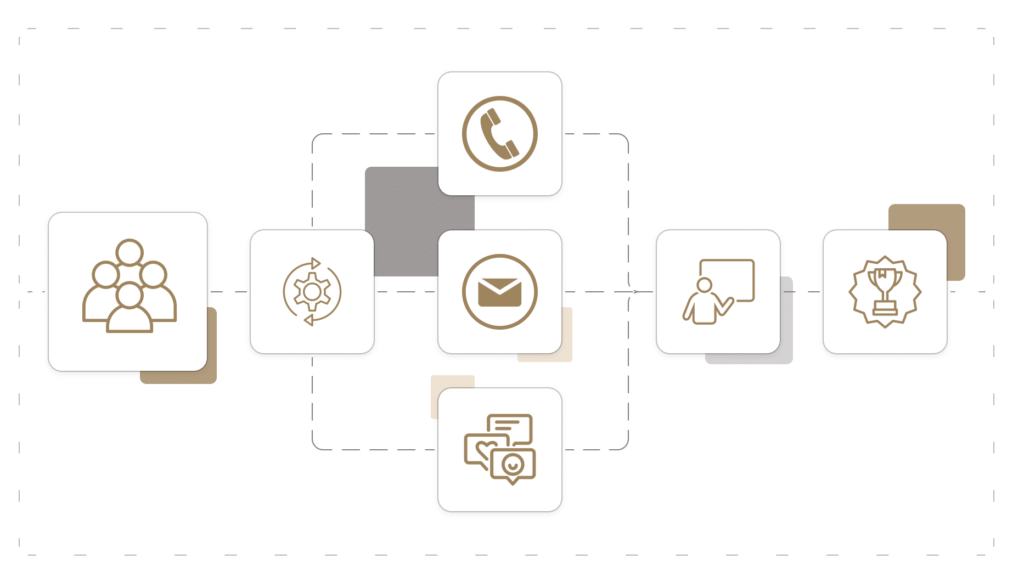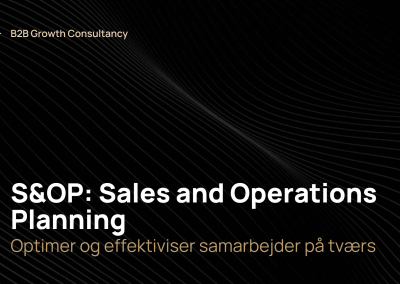B2B sales, or Business-to-Business sales, refers to commercial transactions between two companies. This article dives into what B2B sales entails and how you can optimize your sales process to meet the unique demands and opportunities that the B2B market offers. At Radiant, we are experts in B2B sales and we are ready to help your company improve sales effectiveness. Before we dive into specific strategies, we’ll take a look at the key elements that shape an effective and successful B2B sales strategy.
- What is B2B sales?
- What is the difference between B2B and B2C sales?
- How to succeed in B2B sales
- 8 tips to optimize your B2B sales
- Get help with B2B sales from Radiant
What is B2B sales?
B2B sales or business to business sales, as mentioned above, are the sales exchanged between two companies, hence B2B. B2B sales differ from B2C (business-to-consumer) by having a longer and more complex sales cycle, often involving larger contracts, more stakeholders and tighter conditions. This complexity means that a B2B sales process requires a detailed and strategic approach that can be customized to the unique circumstances of each customer.
In B2B sales, there are also numerous types of sales processes where the scope of terms, length of the sales cycle and number of parties involved can vary significantly. That’s why it’s crucial to develop an elaborate sales strategythat includes customer segmentation and a well-considered strategic approach. B2B sales are often at the heart of a company’s go-to-market strategy and a key component of its growth strategy. A strategic approach to B2B sales requires an in-depth analysis of the market, strong CRM integration, a thorough competitor competitor analysis and, in some cases, using sales tools like the sales wheel to optimize processes.

Below we’ve highlighted the key competencies that are essential for success in B2B sales:
- Deep understanding of the specific market
- Accurate identification and segmentation of potential customers
- Effective communication of the company’s unique value proposition that matches the customer’s specific needs
- Building and maintaining long-term customer relationships
B2B sales in 2025: sales and marketing
As digital technologies reshape the B2B market, sales and marketing are becoming more integrated than ever before. Traditionally, marketing has been responsible for lead generation, while sales has handled direct customer contact. But today’s B2B buyers have changed their behavior – they do much of their research digitally before they even speak to a salesperson.
According to the Boston Consulting Group’s article “Building an Integrated Marketing and Sales Engine for B2B“, the modern B2B buyer is on average two-thirds of the way through the decision-making process before engaging with a salesperson. This means that marketing plays a much larger role in the customer journey and that closer collaboration between sales and marketing is necessary to maximize conversion rates.
🔹 How can B2B companies adapt to these developments?
- Marketing must not only generate leads, but also nurture them throughout the decision-making process. This means a targeted content strategy that speaks directly to the customer’s challenges and needs.
- Sales enablement must be in focus. Salespeople need to have access to the right data and materials from marketing so they can present accurate solutions at the right time.
- CRM systems play a crucial role in integration. A well-designed CRM system ensures that both sales and marketing have access to the same customer data and can work together towards common goals.
Success in B2B sales requires strategic integration between sales and marketing, where data, technology and the customer journey are connected in a unified go-to-market strategy. At Radiant, we help B2B companies optimize their sales strategy, ensure effective CRM implementation and create a strong link between sales and marketing.
Read more about B2B sales strategies and how we can help your business adapt to the digital buying journey.
What is the difference between B2B and B2C sales?
To be successful in B2B sales, it’s important to understand the fundamental differences between B2B and B2C sales. Both target audiences and sales processes differ significantly, and here we review the key aspects that characterize the B2B market.
Complexity in the decision-making process
B2B sales typically involve longer and more complex decision-making processes, as the purchase decision often requires approval from multiple stakeholders within the organization. In contrast, B2C decisions are often simpler and are usually made by the individual consumer without further approval.
Focus on relationships and long-term partnerships
Another key difference is the need for strong, long-term relationships in B2B sales. It’s about building trust and creating a mutually beneficial collaboration that can last over time. B2C sales, on the other hand, is more transactional, with a focus on quick, satisfying purchases that are often driven by immediate needs or wants.
Rational and strategic buying factors
B2B buyers focus primarily on rational decision-making factors such as product quality, durability, long-term costs and the company’s need for efficiency and growth. In B2C sales, decisions are often influenced by emotional factors and consumers’ individual preferences and lifestyle, resulting in more impulsive buying behavior.
Longer sales cycles and structured processes
The B2B sales cycle is typically longer and more structured, with multiple touchpoints and repeated interactions throughout the process. This requires a systematic approach where the pipeline and sales stages are well-defined in order to close deals successfully. In B2C, on the other hand, the sales process is short and fast, often with fewer touchpoints and a higher degree of spontaneity.
Higher investment level and complex contract structure
B2B deals often involve larger investments and complex contract structures, requiring detailed negotiations and tailored solutions. In B2C, transactions are often smaller and more standardized, making them easier to complete without major customization.
How to succeed in B2B sales?
Achieving success in B2B sales requires a targeted strategy that addresses the complex dynamics of enterprise sales. Effective B2B sales is not only about creating great products, but also about understanding the target audience, establishing relationships and navigating an often long and strategic sales cycle. To succeed in the B2B market, there are several essential factors that should be part of any sales strategy – from accurate customer segmentation to effective use of CRM tools and data analysis. Below we review the most important key points that can help your company achieve B2B sales success and drive long-term growth.
Understand target audience behavior
The next step in a successful B2B sales strategy is to gain insight into how your target audience makes purchasing decisions. What process do they follow when buying products or services? Is it a complex decision journey that requires a deep understanding of their specific needs and preferences?
This insight is essential as it allows you to assess how, why and when your potential customers make decisions. With this understanding, you can adapt your communication – should you target indirect decision makers immediately or is there a better time, such as later in the year? Aligning your strategy with your target audience’s decision-making process will significantly strengthen your sales efforts.
Read more about consumer behaviour
Segmentation of leads
Segmentation is a crucial discipline in B2B sales that allows you to tailor both communication and offers to the specific needs of different customer groups. By dividing your leads into specific segments, you can create a more targeted and effective sales strategy that increases the likelihood of successful conversions. To optimize the segmentation process, a CRM system can be an invaluable tool. If you are not yet using a CRM, consider it as an investment in your sales strategy. With a CRM, segmentation can be based on advanced data such as lead scoring, last interaction date, website visitor behavior, industry affiliation and much more. This structured approach to segmentation strengthens your ability to deliver relevant and value-adding messages to each customer group, ultimately boosting sales results.
Read more about B2B segmentation
Sales enablement
Sales enablement is an essential strategy that aims to provide your sales force with the tools, resources and information they need to deliver successful customer interactions and close more sales. This includes up-to-date product knowledge, marketing materials, technology tools and training modules that give them the insights and skills they need to adapt to different customer segments.
By investing in sales enablement, you can create a more efficient and targeted sales force. When employees have access to the right technology and tools to track, qualify and close leads, they can focus more on their core tasks and less on administrative tasks. The result is a stronger sales effort that is more responsive and aligned with customer needs. Sales enablement also creates a culture of continuous learning and development, enabling salespeople to navigate complex B2B sales scenarios with greater confidence and success.
Read more about Sales Enablement
Revenue operations
Revenue Operations (RevOps) is a strategic discipline that focuses on integrating and optimizing collaboration between sales, marketing and customer service to maximize revenue growth. In a modern B2B company, collaboration across these departments is essential as each department contributes to the customer experience at different points in the customer journey. The RevOps strategy promotes a coordinated effort where processes are designed to ensure everyone is working towards the same goal: increased revenue.
RevOps creates a unified and targeted approach that connects departments through shared data, common goals and integrated ways of working. This optimizes information flow, ensuring all departments have access to the latest customer information and can act on it in real-time. By standardizing and aligning processes across sales, marketing and customer service, RevOps creates a more efficient and cohesive workflow, making the company better able to respond quickly to market changes and customer needs. RevOps is therefore essential for companies looking to drive growth through an optimized, data-driven and customer-focused approach.
3 sales tips for successful B2B sales
Define your target audience
Knowing your target audience is the foundation of any successful B2B sales. This involves a thorough understanding of the companies you sell to – their industry, size, and the challenges they face. A deep understanding of these aspects will enable you to customize your communication and solutions to match their specific needs. Spend time researching and gathering data that can help you create a tailored approach for each potential customer.
- Go beyond superficial data. Understand the unique challenges and goals that drive your audience.
- Use this insight to tailor your communication and offer solutions that hit the mark.

Focus on customer relationships
The key in B2B sales is focusing on long-term customer loyalty. Relationship selling is about building and maintaining relationships with key people within the target audience. This requires regular, meaningful communication, a genuine understanding of their business needs and the ability to act as a trusted advisor. Be proactive in your approach and always seek to add value to their business.
- Become a trusted advisor and partner to your customers.
- Focus on mutual respect, ongoing communication and genuine interest in their success.
Read more about customer relations
Be patient and persistent
B2B sales processes can often be lengthy, involving multiple meetings, presentations and negotiations. It’s important to maintain patience and persistence throughout the process, while respecting the customer’s schedule and decision-making process. A persistent but respectful approach can set you apart and show your dedication to meeting customer needs.
- B2B sales processes take time. Be persistent but respectful and be ready to navigate complex decision-making processes.
Read all 12 tips in our article 12 B2B sales tips here
Optimize your B2B sales with Radiant
There are different ways to optimize your B2B sales. As a sales partner to a wide range of companies, we often find the following makes the biggest impact on company sales:
- Get precise in your segmentation
- Streamline the sales process
- Get a tailored and efficient sales pipeline
- Train your salespeople
- Get a CRM system where sales and marketing can work together
With the above initiatives, you are well on your way to optimizing your sales. However, this should be seen as an iterative process that needs to be revisited several times to succeed.
Selling in new markets / to new segments
Alternatively, we offer Sales Go-To-Market, where we test your next market for you for a period of 3 months. Creates a foundation for you to either continue on your own or offer you a solution. The purpose is to test hypotheses in the new market and see if we can open it up for you. The advantage of Radiant is that we have sales consultants from Norway, Denmark and Germany who can represent your performance and service. Read more about Sales Go-To-Market.
Tactical B2B sales
Do you have challenges with which way your sales should go? Have you defined your target audience/ICP correctly, do you differentiate yourself enough and do your USPs reflect this, should you use AI or is your sales process lagging because it is person-dependent and you don’t use automations and a system for this?
With Sales Excellence, we advise companies in the Nordics and DACH on tactical and strategic decisions regarding their B2B sales. If you are entering new markets, we offer Sales GTM and Sales as a Service, where we assist with the operational execution of sales, as well as identifying opportunities and challenges in your new market.
Meet some of our B2B sales experts

Kasper Bjerggaard
Kasper has extensive experience in sales within Corporate Finance, Banking, Payment and FinTech solutions. He has gathered experience from both Radiant and Deloitte where he has helped build the sales department.

Christoffer Tofte
Christoffer has many tasks in developing sales strategies and executing B2B sales on behalf of our customers – he has specifically worked with:
- Understanding the sales process from lead to deal and identifying optimizations
- Building targeted campaigns
- Building and using a sales playbook with best practices for the entire sales process



